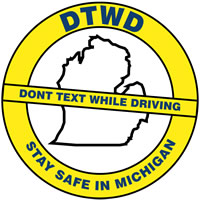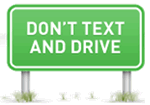|
Texting n Driving, What can and does
happen.

Ashley D. Miller, 18, veered into oncoming traffic and hit
another car head-on while she was texting. She and the other driver, a
40-year-old mother of 1, were killed instantly.

Dana Trammell, 17, was texting someone on her way to her
first day of school of senior year when she crashed and was thrown from her
vehicle. She was pronounced dead at the scene.

Chelsea Ann Bragg, 16, was killed in a rollover crash after
texting while driving. She veered off the shoulder of the road and then lost
control of the car, causing it to roll twice. She was pronounced dead at the
scene.
- 17-year-old Vanna Francis and 15-year-old Ronnie Scroggins
drowned when a car carrying seven teenagers drove off the road and into a river.
The 20-year-old driver admitted she was texting on her cell phone when the car
plunged into the water, and was later arrested.
- 13-year-old Earman Machado was killed Dec. 27, 2007, when a car--driven by Craig P. Bigos, a 31-year-old father of four, who was text messaging--swerved onto the side of the street and struck the boy on his bike. Bigos has been charged with motor vehicle homicide, leaving the scene of an accident resulting in death and driving without a license. - 18-year-old Makayla Lynn Belew was killed when a text-messaging driver hit her as she walked along the side of the road and then drove away from the scene. A year later, Larry Chad Smithey, 28, was arrested for the crime. - 17-year-old Patrick Sims was replying to a text message when he drifted into the bicycle lane and struck and killed cyclist Jim Price, 63. He was charged with careless driving resulting in death.  My
name is Amanda and I have a story to tell… My 19 year old sister was killed May
16th, 2009 in a car accident. She was texting me when her truck entered the
median. She over corrected and flipped end over end several times before being
ejected. The guilt I feel everyday is a hard load to carry. I have felt the
desire to get public education out there since her accident this year. My
name is Amanda and I have a story to tell… My 19 year old sister was killed May
16th, 2009 in a car accident. She was texting me when her truck entered the
median. She over corrected and flipped end over end several times before being
ejected. The guilt I feel everyday is a hard load to carry. I have felt the
desire to get public education out there since her accident this year.It is especially hard on my mom, not only because she lost a child but my sister’s accident happened the same day my dad passed away 9 years prior. I have been given opportunities to speak at high schools and universities in the Kansas/Missouri area (she was attending Kansas State University and a graduate of a Missouri High School).  Getting
Teens to Stop Texting While Driving - Convincing teens not to use their cell
phones while they drive can be much harder than getting them to clean up their
room, but their lives may depend on it. The research comes from The Children's
Hospital of Philadelphia and State Farm Insurance. Getting
Teens to Stop Texting While Driving - Convincing teens not to use their cell
phones while they drive can be much harder than getting them to clean up their
room, but their lives may depend on it. The research comes from The Children's
Hospital of Philadelphia and State Farm Insurance.The findings are based on the nationally-representative National Young Driver Survey (NYDS) of more than 5,500 teenagers. You can find them in the scientific journal Accident Analysis and Prevention. Many parents may intuitively think that scaring kids with the horrors of car accidents, death and dismemberment may shock them out of using their cell phones while driving, but the research indicates otherwise. "When it comes to predicting their frequency of cell phone use while driving, the positive beliefs teens have about refraining from this behavior are more powerful than their negative beliefs," Jessica Hafetz, Ph.D., said in a press release. Hafetz is the study's lead author. "More specifically, teens also attached more weight to safety-related beliefs over those that are purely social," Hafetz said. "For instance, the positive belief of paying attention to their driving was more important than the negative beliefs of seeming less social and missing out on gossip or important news." The study found teens who said they do not frequently use a cell phone behind the wheel believe the benefits of putting away their phone while driving outweigh any drawbacks. These teens cited benefits including: •Being able to pay better attention to their driving •Being less likely to have a crash •Following the law Conversely, teens who said they frequently engage in cell phone use while driving cited the following drawbacks of refraining from using their phones: •Getting lost or forgetting something • Not being able to let others know where they are or when they'll arrive • Not having their parents be able to reach them The authors consider these to be valid safety concerns for which there are alternatives. Some Tips for Parents - The authors of the study said that parents should acknowledge that teens want to have a cell phone in the car in case of an emergency, but should also convey a clear message that their teens are never to use a cell phone while driving. They note that teens don't respond well to restrictions that appear punitive or controlling, or that single teens out as a group. Some positive practices for cell phone use in the car (but not while driving) • Complete any call or text before starting the car • Know directions before turning the ignition key rather than relying on a phone call or GPS to show the way • Check in with friends or parents only after you arrive • Pull over to a safe place for urgent calls or have a responsible passenger answer the phone Federal statistics show a driver's crash risk is four times higher when the driver uses a cell phone. 
  |

 Is
any text message worth dying over?
Is
any text message worth dying over? 